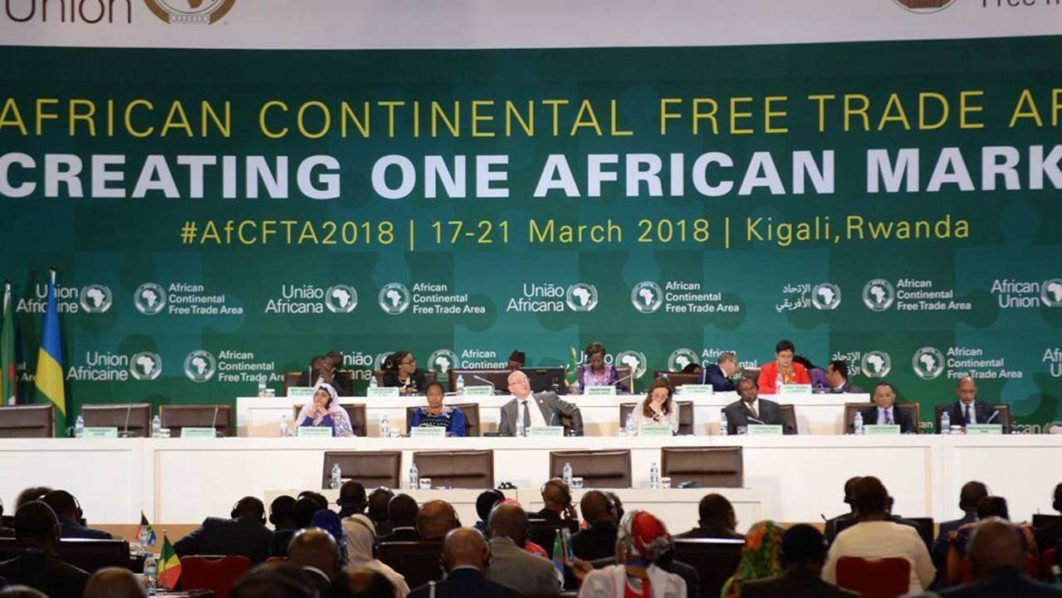
Last week the African Union (AU) announced the postponement of the implementation of the world’s biggest trade area, the African Continental Free Trade Agreement (AfCFTA), by at least six months, citing the challenges posed by Covid-19. Whilst the AfCFTA entered into its operational phase on July 7, 2019 – only three years after the AU started the negotiation process – the last few months have highlighted difficulties in agreeing the detail of such an ambitious project. However, this newly announced delay has caused a reaction: influential business leaders urged the heads of state to push ahead with trading and further negotiations, in an attempt to avoid further delay in the AfCFTA’s full implementation.
For a project that was already suffering delays in the detailed phase two negotiations, Covid-19 presents obvious further difficulties. It will be interesting to see whether the implementation of AfCFTA can be progressed in the current climate, but the strong reaction to the delay shows that the political and economic desire behind this free trade zone remains strong. There will be further tests of this desire to come, but while there may be further delays, the reality of a united trade zone across the continent remains closer than ever.
AfCFTA will be a key driver of the African Union’s new “paradigm” for Africa post Covid-19, which they recently called for. This dictates fundamental changes to traditional global supply chain models. In this paradigm, Africa must focus on adding value in Africa for Africa, increasing intra-African trade and replacing or at least challenging China as the major source of global supply. Covid-19, with closed borders and damaged economies clearly presents a serious challenge to intra-Africa trade in the short and possibly medium term. It is hardly surprising that the champions of intra-African trade are concerned about any delay to AfCFTA in what is bound to be a very long process. But the prize for success is immense and current global disruption opens new opportunities for breaking the status quo. Hogan Lovells has been monitoring closely all developments on the AfCFTA, including through a dedicated report and website (https://www.hoganlovells.com/en/knowledge/topic-centers/hogan-lovells-afcfta). Andrew Skipper, the head of Hogan Lovells Africa Practice has been speaking to a range of senior African commentators in the series of “A perspective” podcasts. There is a clear focus on building trade in Africa for Africa post-Covid-19, and this simply highlights the need for progress to be made.
The AfCFTA is widely recognised for the impressive ambition behind its objectives, seeking to unite 1.2 billion people in a $3.5 trillion economic area. Yet, in spite of the mammoth task of negotiating the AfCFTA, the agreements, which set up the foundations of the free trade zone, were reached at a remarkable pace. On May 30, 2019, the AfCFTA came into force, only three years after the AU first began negotiations. Indeed, this impressively strong political will not only meant that an agreement was finalised at an unprecedented speed, but, while there was initial hesitation from major economies like Nigeria, within a relatively short period of time every country on the African continent but one (Eritrea) signed up to the Agreement.
As such, it is perhaps unsurprising that there has been resistance to the announcement from Wamkele Mene, Secretary- General of the AfCFTA secretariat, that the implementation of the AfCFTA would be delayed from the planned start date of July 1, 2020, until likely the beginning of next year, due to disruptions caused by the global pandemic.
Further, the AU summit scheduled to encourage trade negotiators to conclude their bargaining on service schedules, tariff reductions and rules of origin has been postponed from May to December 2020. Reaction was strong: over 25 representatives of influential businesses and organisations on the continent, representing various sectors of the economic community (including the African Airlines Association, Orascom, Pharco, Ecobank…) published an open letter to the continent’s political leaders urging the Union to push ahead with the implementation of the AfCFTA during this difficult period. Trade should still start in July, they argued, and negotiations should continue, even if the full AfCFTA trading might be delayed thereafter. They further argued that the AfCFTA was in many ways a cure for the Covid-19 situation, allowing free trade in essential items such as pharmaceuticals, and that there was in fact a “silver lining” to the Covid-19 situation, which “opened the door for industrialization”. It would be a mistake to pass up these opportunities, they point out.
One factor behind this reaction might be the comparatively limited impact of Covid-19 as an illness in Africa so far. Whilst Covid-19 has of course had a catastrophic global impact, this has not so far been as devastating in terms of health (albeit that global economic contagion has been great) as many feared on the African continent, with many giving credit to the swift action taken across Africa to contain Covid-19. As of early May, there are around 50,000 confirmed cases across the continent (just 1.2 percent of the global total), with a comparatively low 2,000 confirmed deaths. It is in this context that the representatives of the business community recently argued that it would be a shame to waste the opportunity and head down a path of delays.
While Covid-19 clearly presents issues in implementing the agreement and concluding the negotiations, there had already been warning signs that delay in the final agreement and application of the AfCFTA regime could be inevitable. As some warned when the treaty, which set out the broad principles of the free trade area but left many specifics for a second phase of negotiations, the devil can often be in the detail. Even before Covid-19, the challenges of achieving consensus were apparent and delays had crept into the tight schedule of implementation. The Phase II negotiations relating to the investment protocol, for example, had already slipped from January to June 2020 and then again to January 2021. This is perhaps unsurprising – the investment protocol, as with the intellectual property and competition protocols currently in negotiation, poses difficult questions to which African States have in recent years adopted different approaches.
In terms of investment protection, for example, while some States have been actively signing bilateral investment treaties (BITs) in recent years (for instance, Morocco, Congo, Gambia and Burkina Faso), others have taken a different approach (Tanzania for instance terminated its BIT with the Netherlands in 2019, following similar activity from South Africa). Finding a consensus to all these questions is clearly a challenging process, and, beyond the publicly declared delays, there is very little information currently available about the progress of the ongoing negotiations.
It will therefore be interesting to monitor how the African Union finds a balance to the current challenges. Ministerial meetings this week have confirmed that there will be delay, indicating that at least six further months will be needed, but even beyond that there remains uncertainty. This is perhaps the first time that the powerful drive behind the AfCFTA in recent years has faced a serious divergence of views. On the one hand, business leaders are clearly concerned to take advantage of all the opportunities that the AfCFTA will bring, even taking advantage of the ‘silver lining’ opportunities that may arise from the impact of Covid-19. On the other hand, the diplomats of the AU will be anxious to avoid a rushed-through application of the treaty.
An incomplete set of policies could lead to similar criticisms as have been levelled against the difficult practical application of certain regional cooperation agreements on the continent. Wherever the balance is struck, the potential of the AfCFTA remains enormous. Those behind the AfCFTA will therefore hope that these are temporary teething issues and that the ambition of the largest free trade zone in the world will become an effective and practical reality.
Skipper and Kendra are lawyers with Hogan Lovells.






